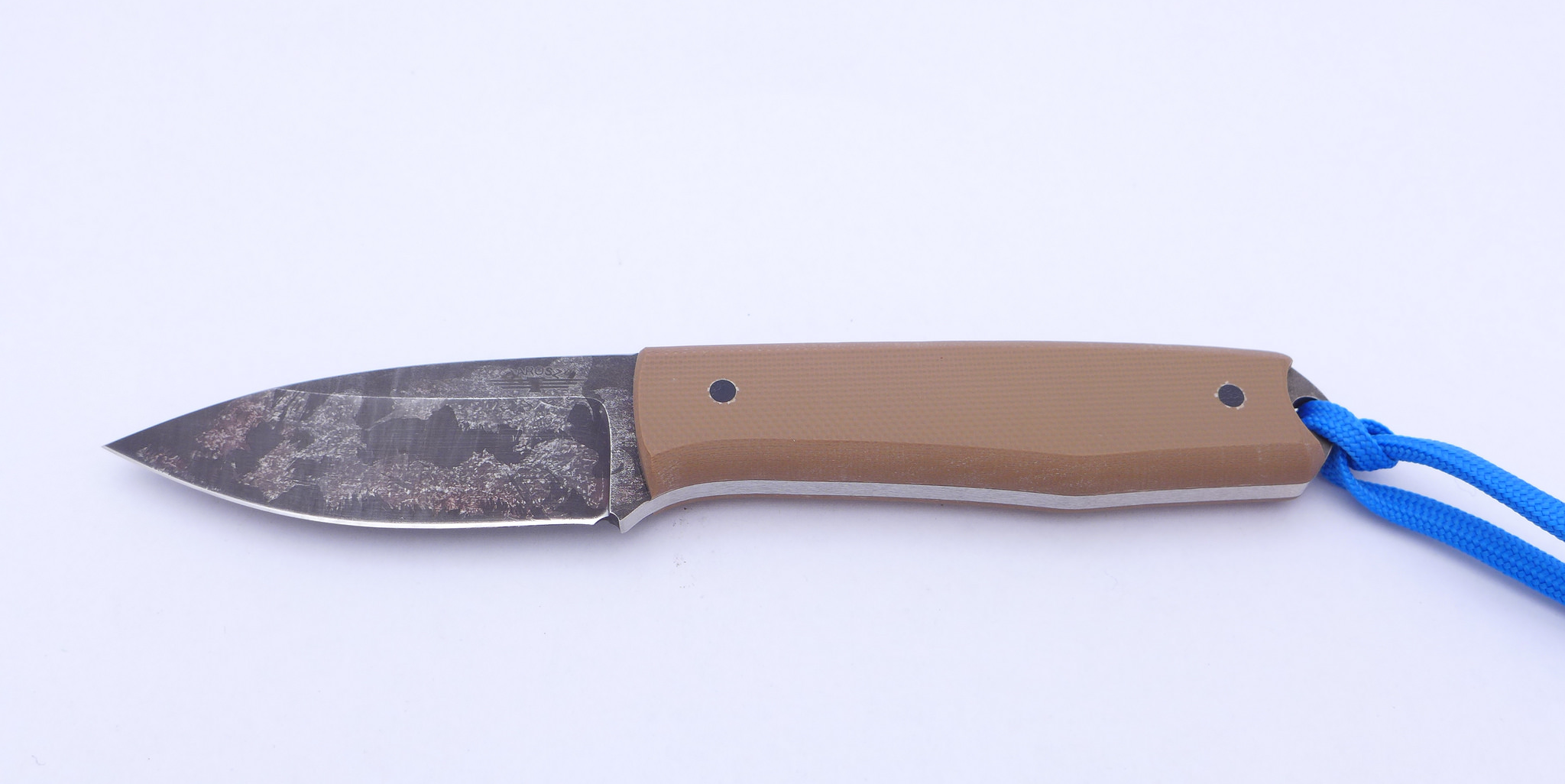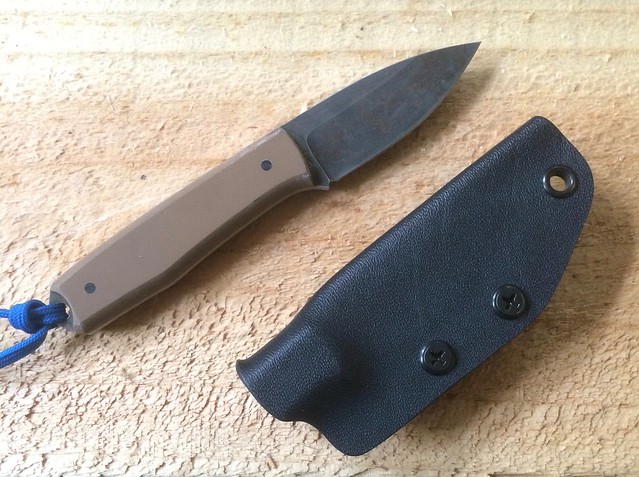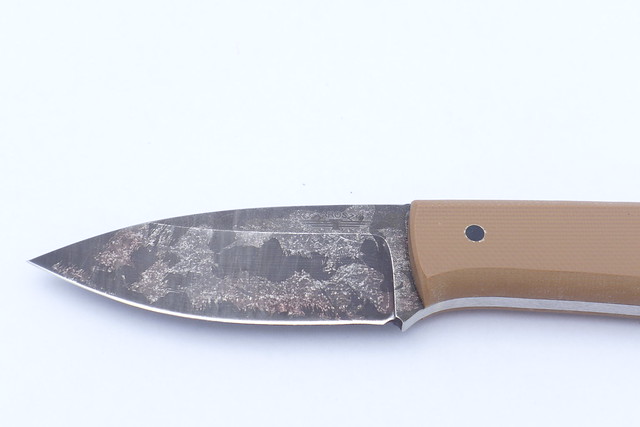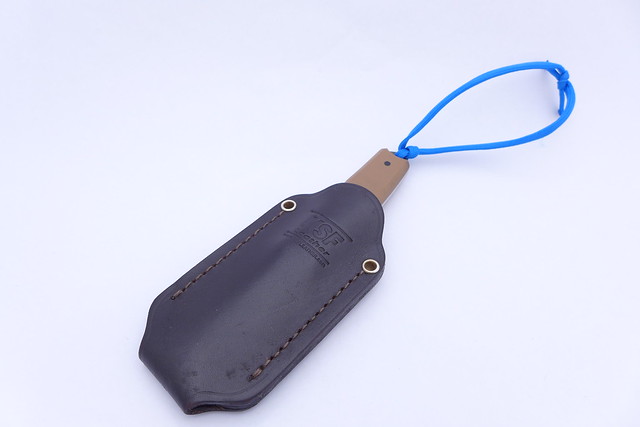Custom Knife Review: Jarosz JFS
Tony Sculimbrene 03.23.16

The world of knives has gone absolutely crazy over the last three years. It used to be that custom knives were rare trinkets that filtered down from the masses like golden tablets–objects of reverence. But now the market as exploded and the knife community’s internet outlets, Youtube, Instagram, and various sites, are positively chock full of knives that cost four figures. I have dabbled in the custom world, I have a half a dozen or so knives, but generally I am scared away by prices that make using these tools difficult to stomach. What fun is there in having a knife that is too expensive or fancy to use?
So when I found the Jarosz JFS on Jesse’s site selling for $129 without a sheath, I was pumped. I had been looking for a small, camp-knife-sized fixed-blade for a few years, and the JFS fit the bill exactly. The lack of a sheath is always big problem for me. I have yet to take the sheathless plunge on a Busse, so I was worried that the JFS would just sit in my knife chest, sheathless, collecting dust. But that hasn’t happened for two reasons: the knife is just too damn good to put away, and I had an awesome sheath made for the blade. As a result this is really a review of both the JFS and my custom sheath made by Bayou Custom Sheathes. All told the set cost me around $170, a great deal for a handmade knife and a handmade sheath.
Description
The JFS is the smallest fixed blade pattern made by Jesse Jarosz. There is no product page. Jarosz is a Nebraskan that, in recent years, has caught the eye of the custom knife world. He was given the best new maker award at the USN Gathering IV in 2012. He is known for simple silhouettes and super clean grinds. The JFS is no different.
Mine is made of AEB-L, a German steel typically used in shaving razors. It gets exceptionally hard for its carbon content, rockwelling at around 62 HRc. The JFS has a 2.5 inch cutting edge and an overall length of 6 inches. I have medium hands, and the JFS accomodates all four fingers, though there is a bit of scrunching involved.
My JFS has tan handles and a finish that Jesse called an acid camo wash. It is by far the most aggressive blade finish I have ever seen, making a Kershaw Blackwash look prim and proper by comparison. With the hollowed out paracord lanyard the JFS weighs 2.76 ounces. In its custom sheath with Tec Loc attachment, it weighs 4.52 ounces.
The grind is a very substantial hollow grind and the profile is a simple drop point. The knife came screaming sharp from Jesse.
The custom sheath is made by Joye over at Bayou Custom Sheathes. I found BCS on Instagram and the service was insanely fast. I had two sheathes made–one for this knife and one for a knife I was testing–and both came back in less than a week. Both were snap tight and both had Tec Locs installed. The rivets were clean and even, none went through the Kydex, and the details were attended to. There is a drain hole at one end and a flared opening at the other. All in all, it is a perfectly made sheath for the JFS, making a stellar carry package.
Kydex sheathes aren’t the most complex thing in the world, but having many made for me over the years, I can tell you that the details matter. Bayou Custom Sheathes got them all correct.
Testing
I have had the JFS for 8 months and in that time it has become one of my most carried knives when I go into the woods. There is an old quarry near my house, a quarry that sits in a glacial moraine, and that rocky, sandy environment has been an excellent place for testing out the JFS. My son and I will often go out in the late morning, eat lunch in what we call the Secret Desert, and then hike around for a while before coming back before dinner.
The JFS has had the opportunity to cut and whittle all kinds of wood–oak to pine, green to dry–and it has done so with exceptional performance. There are large piles of logs and trees, basically where the urban forestry people leave stuff, and I have given the JFS a heavy workout. The heavy hollow grind is excellent, as is the drop point shape.
Around the camp fire and around the house, it has been quite good, too. I like the Tec Loc’s versatility. If I am doing yard work I can carry the knife vertically, and if I am hiking I can carry it horizontally to keep everything out of the way. Cutting dirty roots and slicing through cardboard has been very easy with the JFS.
Design
The overall design is exceptionally simple: a small, handle-heavy EDC fixed blade. I am still not comfortable carrying this knife during a trip to the grocery store, but it’s not that obtrusive. In a more rural location, you might be able to pull it off. On a hike, this thing is great–compact enough to really move around, but still more hardy than even the toughest folder.
Jesse hit a lot of little points. First, note the true ricasso. This allows you to sharpen the edge completely. Second, I really like this combination of grind and blade shape. I love me some convex grinds, but on a knife this small, I think I might prefer a hollow grind as it allows the knife to excel in detail work. I had a Bark River Lil’ Creek, which is basically the same size as this knife. It was quite good doing fine cutting tasks, but it didn’t have that explosive, zipper-like performance the JFS does when cutting through something like cardboard. Maybe this is my inexperience with fixed blades, but I think in this role I like the hollow grind.
One thing I am not thrilled with is the handle shape. It is quite versatile, allowing for many different grips, but it lacks the sticking power of something like the Becker handle. It’s good, but not great. This is just a sign of how difficult handles are to design.
Implementation
There are very few points where I would complain about the JFS. The spine is a bit roughly cut, but nothing outrageous. All of the pins are fingernail flush and the G10 handle is nicely shaped and polished. The grind is simply immaculate. The plunge lines are even and crisp enough to practically shave hair. The main cutting bevel is insanely sharp, one or two of the sharpest knives I have ever received.
Overall, it’s not to the level of something like a high end, fixed blade like a Fiddleback Forge knife, but it is very good, especially compared to production blades in the same price range. One thing I would change if I could is the color of the handle. When I bought the knife, all of the other colors had sold out, but a tan handle is terrible out in the woods, hence the bright blue lanyard.
Conclusion
Customs used to be such rarified things, but the JFS is a custom that you can afford, is fun to use, and good to have in your hand. With a good sheath, like the one I got from Bayou Custom Sheathes, the knife is an excellent outdoor knife and a good replacement for a large folder. You don’t have to worry about thumping on the JFS because it is a fixed blade, but its size gives you the carry package and mobility that a folder does.
Two of Jesse’s other designs, the Globetrotter and the Turok, have been put into production by KaBar, but thus far the JFS has not. Even if it was, given the prices of the other two and the steel they run, I think the JFS custom would win out. They aren’t always in stock, but for the money they are a very good buy.




